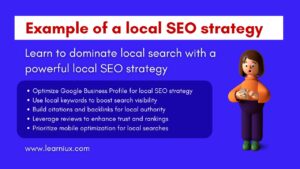Introduction
In an ever-evolving digital landscape, search engines are the backbone of how we navigate the vast expanse of the internet. These powerful tools act as gateways, helping users find information, products, services, and answers with just a few keystrokes. From students researching academic subjects to businesses optimizing their online presence through SEO, search engines are indispensable. This comprehensive guide delves into the world of the top search engines, exploring their features, market dominance, unique offerings, and how they meet the needs of diverse users. Whether you prioritize speed, privacy, or innovative AI-driven results, understanding the power of these platforms can enhance your online experience and inform your SEO strategies.
The importance of search engines goes beyond casual browsing. They influence how businesses reach their audiences, how information is prioritized, and how users view the digital world. Since SEO (Search Engine Optimization) is a key factor in online visibility, choosing the right search engine can impact both personal productivity and business success. This article will take an in-depth look at the top search engines, their key features, and how they align with user preferences and SEO goals.
Why Search Engines Matter to Users and SEO
Search engines are not just tools for finding websites; they are sophisticated systems that process billions of queries every day, using complex algorithms to deliver relevant results. For users, they provide fast access to information, while for businesses, they are crucial for driving traffic through SEO. Effective SEO strategies depend on understanding how search engines rank content, which makes it essential to explore their effectiveness.
The Role of Search Engines in Digital Navigation
Search engines index billions of web pages, organizing them to provide users with the most relevant results. They use crawlers to scan the internet, analyze content, and rank pages based on factors such as relevance, authority, and user experience, all key components of SEO. The top search engines excel at delivering fast, accurate, and user-friendly results, making them indispensable for both casual users and SEO professionals.
The Influence of Search Engines on SEO Strategies
SEO is the art and science of optimizing websites to rank high on search engine results pages (SERPs). The top search engines, with their unique algorithms, determine how content is optimized. For example, Google’s focus on user intent and high-quality content shapes SEO practices, while privacy-focused engines like DuckDuckGo appeal to audiences seeking anonymity. Understanding these platforms can help businesses effectively tailor their SEO efforts.
Key Features of Top Search Engines
The best search engines stand out for their innovative features, which address a wide range of user needs. These features not only enhance the user experience but also influence how SEO strategies are developed to increase visibility.
Speed and Accuracy in Top Search Engines
Speed is a hallmark of top search engines. Platforms like Google process queries in milliseconds, using vast data centers and advanced algorithms to deliver accurate results. Accuracy is equally important, as users expect answers that match their intent. For SEO professionals, understanding how engines prioritize speed and relevance can guide content optimization.
Privacy Protection in Top Search Engines
With growing concerns about data privacy, many top search engines prioritize user anonymity. Platforms like DuckDuckGo and StartPages do not track searches or store personal data, appealing to privacy-conscious users. This focus on privacy also impacts SEO, as businesses target audiences with content that aligns with their values on these platforms.
AI and Machine Learning Integration in Top Search Engines
Artificial intelligence (AI) and machine learning have transformed search engines, enabling features like voice search, natural language processing, and personalized results. For example, Google’s AI Overviews provide a summary of content directly on the SERP, allowing SEO professionals to influence how content appears in these snippets.
Multilingual and Localized Search Capabilities
Top search engines like Baidu and Yandex excel at providing localized results that complement specific languages and regions. This is important for SEO, as businesses targeting global markets need to optimize for regional search engines to effectively reach diverse audiences.
Integration with other tools and services
Many search engines integrate seamlessly with productivity tools, browsers, or ecosystems. For example, Bing’s integration with Microsoft Office increases its usefulness for enterprise users, while Google’s ecosystem includes Gmail and Google Drive. These integrations can influence SEO strategies by prioritizing content that is compatible with these ecosystems.
Comprehensive List of Top Search Engines
Based on recent data, here is an in-depth look at the top search engines that dominate the global market. Their market shares reflect their popularity: Google holds an estimated 89.89%, Bing has 3.92%, and Yandex has 2.19%. Each has unique features that cater to specific user needs and SEO opportunities.
Google is the leading top search engine
Google is synonymous with search, processing over 8.5 billion queries per day. Its dominance is due to its massive index, cutting-edge AI, and features like Google Lens and AI Overviews. For SEO, Google’s algorithms prioritize high-quality content, mobile-friendliness, and user experience, making it a primary focus for optimization efforts.
Key Google Features
- AI Overviews: Summarizes answers directly on the SERP, reducing the need for users to click.
- Google Lens: Enables visual search, allowing users to search using images.
- Personalized Results: Uses user data to optimize results, although this can be adjusted for privacy.
- SEO Results: Google’s focus on E-A-T (Expertise, Authoritativeness, Trustworthiness) shapes content strategies.
Why Google Dominates
Google’s vast infrastructure and constant innovation keep it ahead. Its algorithm updates, like the 2023 Core Updates, emphasize user intent, making it important for SEO professionals to align content with these changes.
Bing as a Competitive Top Search Engine
Microsoft’s search engine, Bing, holds a 3.92% global market share and 7.48% in the US. It offers strong visual search, integration with Microsoft 365, and a rewards program. For SEO, Bing’s less competitive SERPs can provide businesses with opportunities to rank higher with targeted optimization.
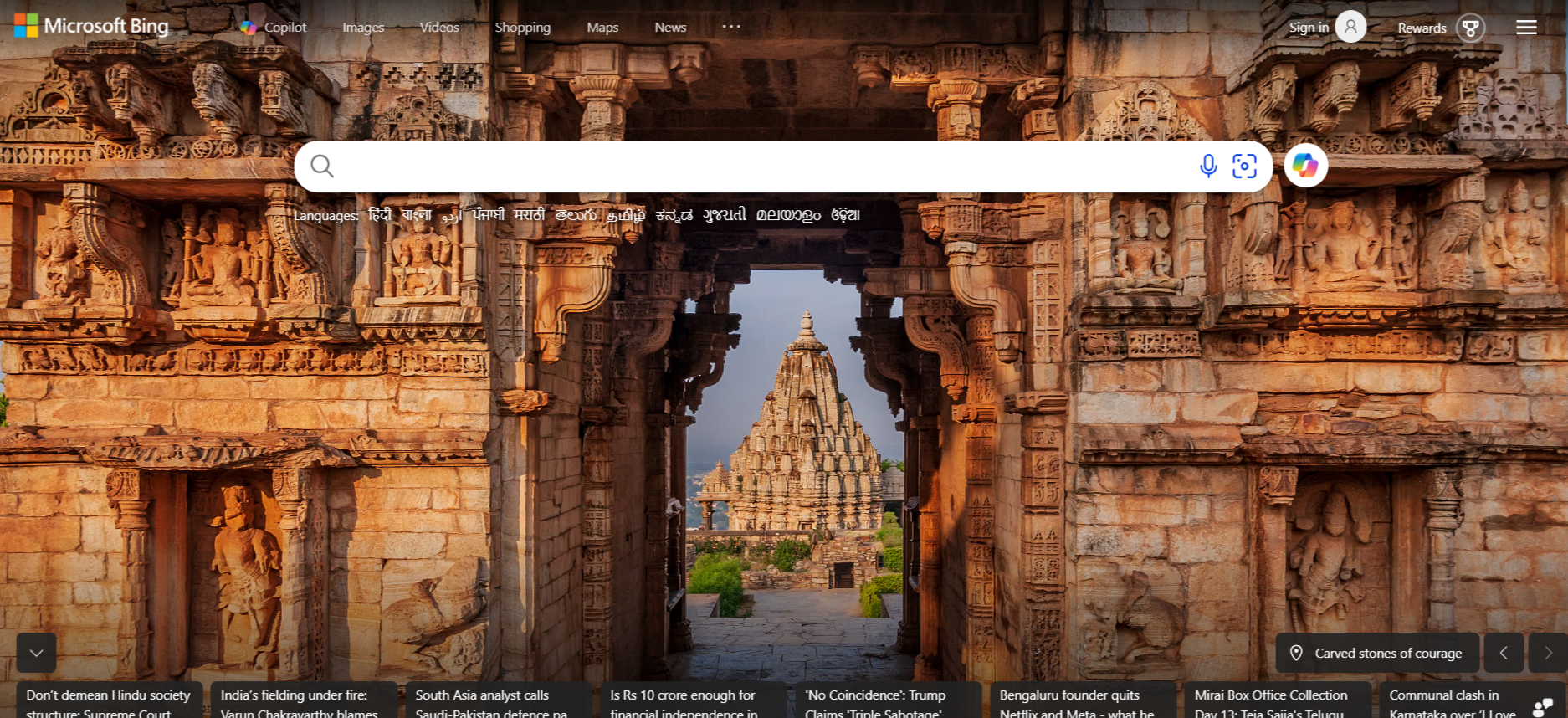
Key Bing Features
- Visual Search: Allows users to search using images, competing with Google Lens.
- Microsoft Integration: Syncs with Windows, Edge, and Office, increasing productivity.
- SEO Opportunities: Bing values traditional SEO signals like backlinks and keyword optimization, offering a less saturated market than Google.
Bing's Market Position
While Bing lags behind Google, its partnership with Yahoo and focus on enterprise users make it a strong competitor. SEO strategies for Bing often emphasize clear, keyword-rich content and technical optimization.
Yahoo, among top search engines
Once a search giant, Yahoo now relies on Bing for its search results. It is still popular for its news, email, and finance portals. For SEO, Yahoo’s audience leans toward older demographics, requiring content tailored to their interests.
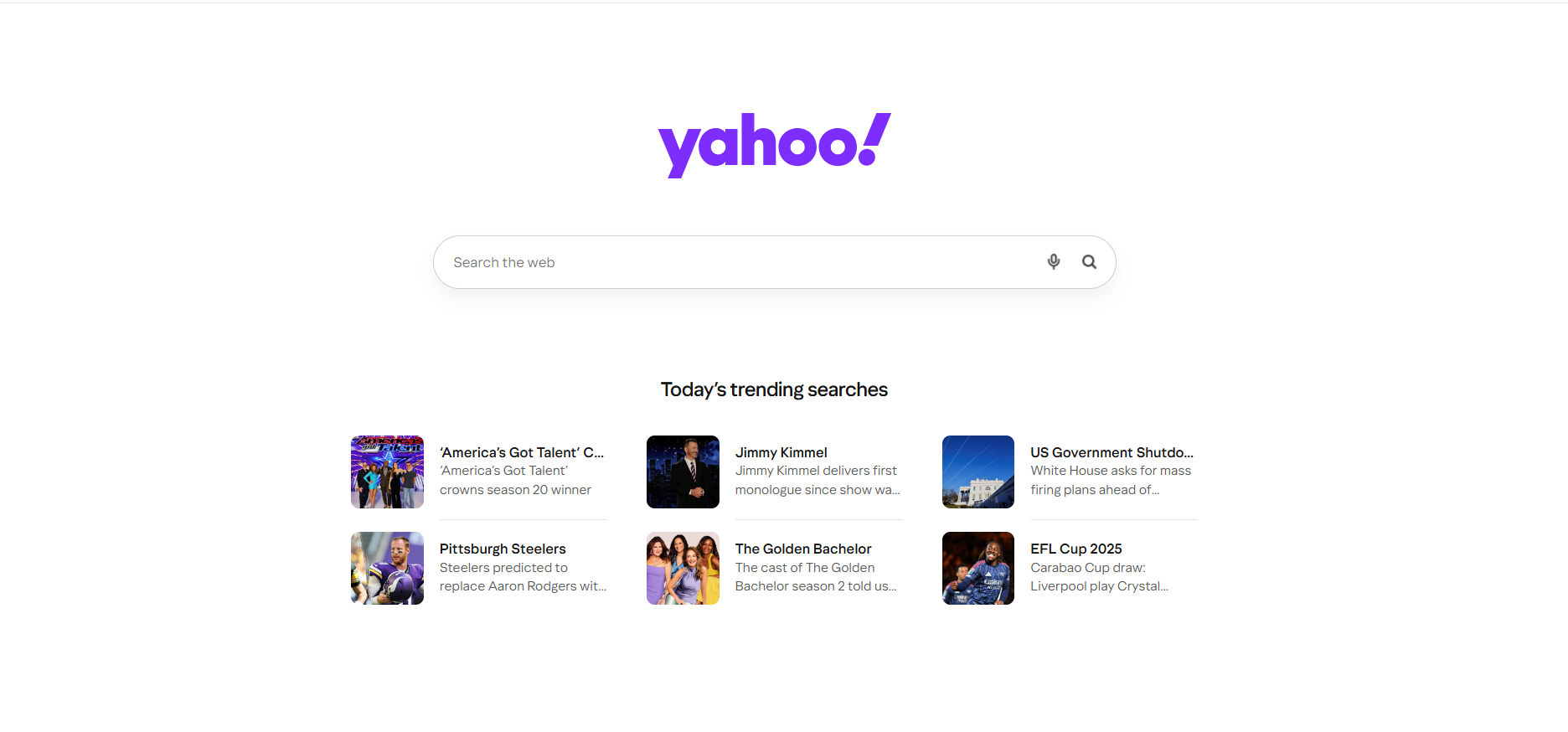
Yahoo’s key features
- Content Hub: Combines search with news and entertainment, which appeals to casual users.
- Bing-enabled results: Leverages Bing’s algorithm, making SEO easy for both platforms.
- SEO considerations: Focus on lifestyle and informative content to reach Yahoo’s user base.
Yahoo’s relevance
Yahoo’s integration with Bing makes it a secondary but relevant player. SEO professionals can target their audience with content optimized for Bing’s algorithm.
Baidu as the regional top search engine
Baidu dominates China’s search market, with over 70% share in the region. It excels in Chinese-language search, multimedia results, and mobile integration. For SEO, businesses targeting China should optimize for Baidu’s unique requirements, such as ICP licensing and localized content.
Key features of Baidu
- Localized search: Prioritizes Chinese content and complies with regional regulations.
- Mobile focus: Optimized for China’s mobile-first market.
- SEO challenges: Requires Mandarin content, fast-loading sites, and compliance with censorship regulations.
Baidu’s global influence
Although primarily regional, Baidu’s influence extends to businesses looking to enter the Chinese market, making it an important platform for global SEO strategies.
Yandex among the top search engines
Yandex maintains a strong position in Russia, with a 2.19% share of the global market. It offers mapping, translation, and cloud services, which compete with Google in the region. For SEO, Yandex prioritizes local content and user engagement metrics.

Key features of Yandex
- Regional strength: Excellence in Russian-language search and localized services.
- Variety of offerings: Includes navigation and e-commerce tools.
- SEO strategies: Emphasizes fast load times and region-specific keywords.
Yandex’s role
Yandex is a great choice for businesses targeting a Russian-speaking audience, which requires SEO according to its unique algorithm.
DuckDuckGo for Privacy Among Top Search Engines
DuckDuckGo has gained popularity for its privacy-first approach, which avoids user tracking and data collection. It attracts users wary of surveillance, making it a niche but growing player. For SEO, DuckDuckGo’s focus on organic results offers opportunities for high-quality content.
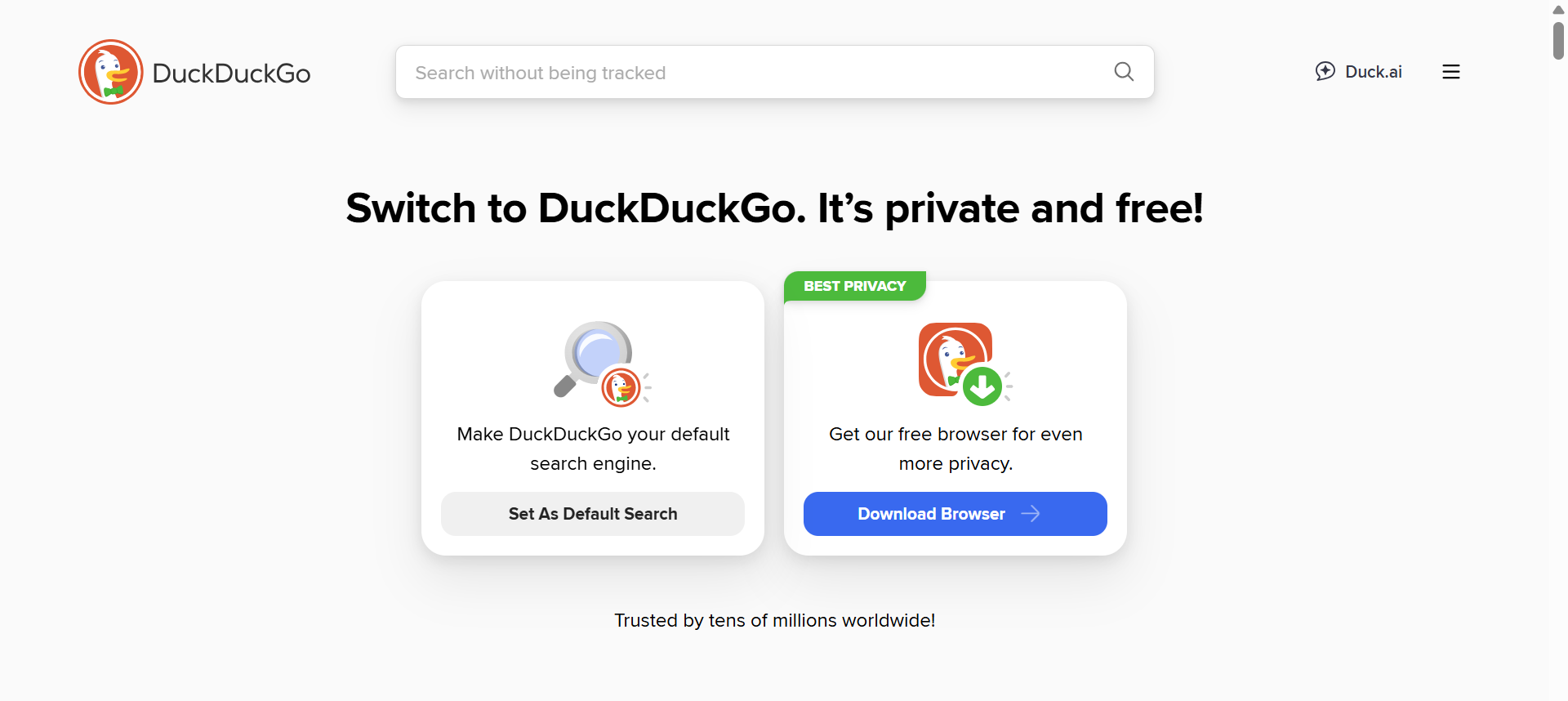
Key DuckDuckGo Features
- No Tracking: Doesn’t store search history or personal data.
- Bang Command: Allows for faster searches on specific sites (e.g., !w for Wikipedia).
- SEO Benefits: Rewards quality content over paid advertising, leveling the playing field.
DuckDuckGo’s Appeal
Its focus on privacy attracts a dedicated user base, and DuckDuckGo’s SEO strategies emphasize authentic, user-centric content.
Brave Search as an Emerging Top Search Engine
Built by the Brave Browser team, Brave Search focuses on privacy and ad-blocking. Its independent index sets it apart from engines that rely on Google or Bing. For SEO, Brave’s focus on unbiased results offers new opportunities.
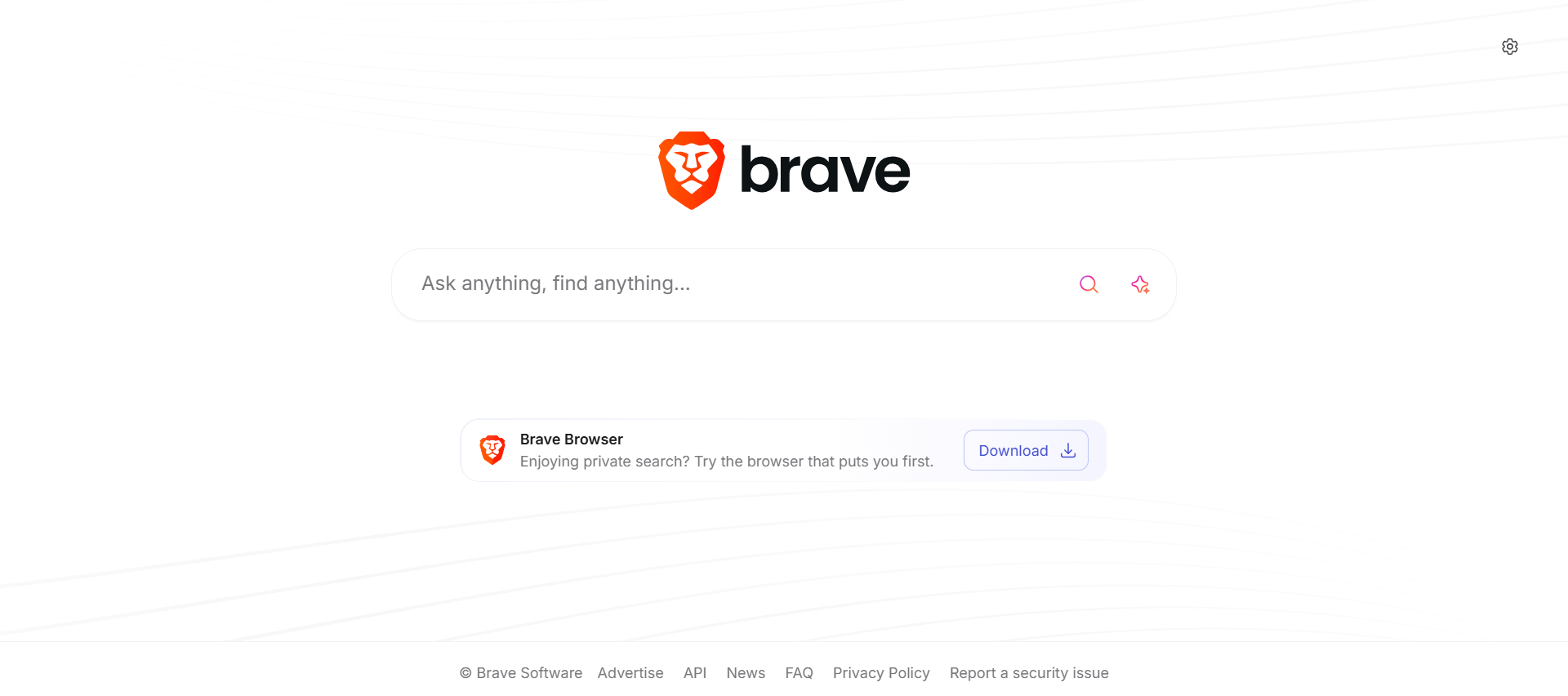
Key Features of Brave Search
- Independent index: No reliance on third-party engines.
- Ad privacy: Blocks intrusive ads, enhancing the user experience.
- SEO capabilities: Prioritizes clean, relevant content without the influence of large ads.
Brave’s growth
Brave Search is a rising star, attracting users looking for alternatives to traditional engines. SEO strategies should focus on technical optimization and user intent.
Ecosia among the top sustainable search engines
Ecosia connects search with environmental impact, using profits to plant trees. It leverages Bing’s index but differentiates itself from its eco-friendly mission. For SEO, Ecosia’s audience values sustainability, influencing content strategies.
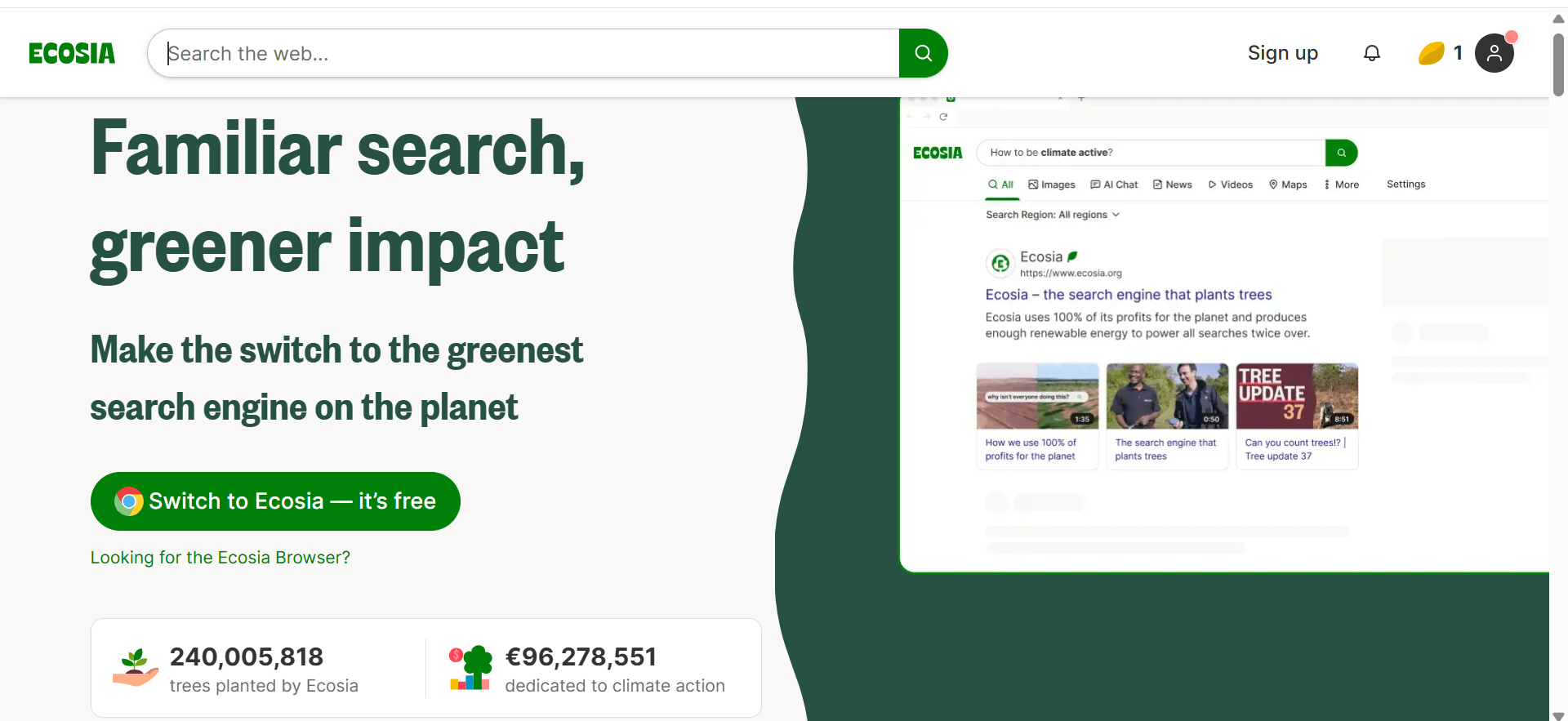
Key features of Ecosia
- Eco Mission: Funds reforestation with ad revenue.
- Bing-powered: Shares Bing’s SEO requirements.
- SEO Focus: Appeals to an environmentally conscious audience with green content.
Ecosia’s Niche
Ecosia’s unique selling point makes it a favorite for eco-minded users who need SEO that highlights sustainability.
Startpage for Anonymous Top Search Engines
Startpage delivers Google results anonymously, combining privacy with quality. It’s ideal for users who want Google’s accuracy without the tracking. For SEO, Startpage aligns with Google’s optimization strategies.
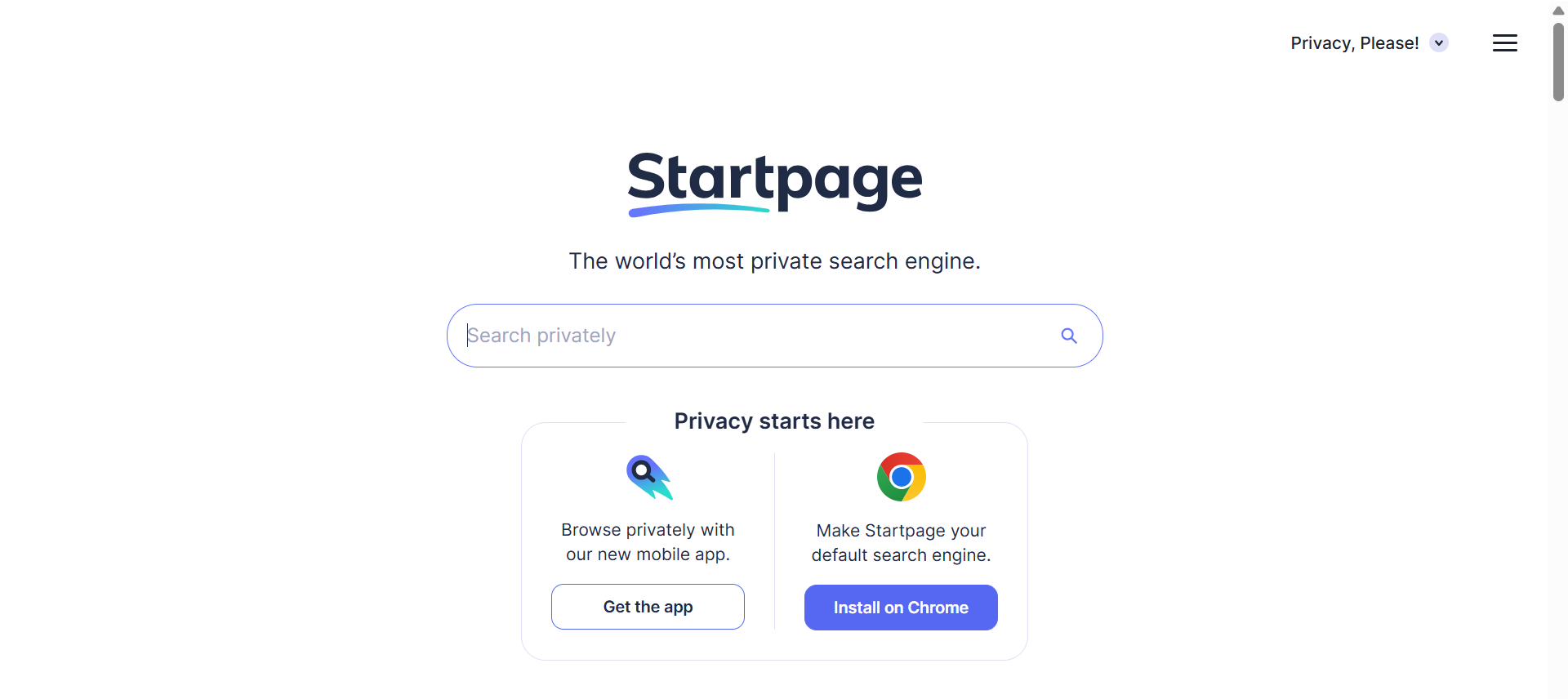
Startpage Key Features
- Anonymous Proxy: Removes tracking from Google results.
- Clean Interface: Focuses on core search functionality.
- SEO Alignment: Reflects Google’s ranking factors.
Startpage Value
Startpage combines privacy and performance, making it a strong choice for SEO professionals targeting privacy-conscious users.
Mojeek is an independent top search engine
mojeek stands out for its completely independent index, avoiding reliance on Google or Bing. It prioritizes unbiased results, attracting users looking for neutrality. For SEO, mojeek rewards original content and technical excellence.
mojeek’s key features
- Independent crawling: Creates its own index for unique results.
- No tracking: Ensures user privacy.
- SEO opportunities: Prioritizes high-quality, original content.
mojeek’s strengths
As an independent player, mojeek offers a fresh approach, with SEO strategies that focus on authenticity and technical SEO.
Benefits of Using Top Search Engines
Search engines are the backbone of how we connect and interact with the vast digital world, offering a variety of benefits that enhance the user experience and provide significant opportunities for search engine optimization (SEO). From simplifying daily tasks to ensuring data security and distributing diverse information, top search engines serve a variety of needs and shape how businesses approach online visibility. Platforms like Google, Bing, DuckDuckGo, Baidu, and Yandex each bring unique strengths that benefit both casual users and SEO professionals. This article explores these benefits in detail, highlighting productivity, security, access to information, and how they impact SEO strategies.
Increased Productivity with Top Search Engines
The most important benefit of using top search engines is their ability to increase productivity through innovative features and seamless functionality. Modern search engines are designed to deliver information faster, saving users time and effort. For example, Google’s voice search allows users to perform queries hands-free, making it ideal for multitasking or on-the-go searches. Features like Quick Answers, which display quick facts or calculations directly on the search results page, eliminate the need to visit multiple websites. Similarly, Bing integrates with Microsoft 365 tools, enabling users to seamlessly transition between search and productivity tasks like document editing or email management.
For businesses and SEO professionals, these features present valuable opportunities. Optimizing content for features like Google’s Featured Snippets or Bing’s Visual Search can significantly increase visibility on search engine results pages (SERPs). For example, structuring content with clear titles, concise answers, and relevant keywords can help a website appear in Featured Snippets, driving more clicks and engagement. By taking advantage of these productivity-boosting tools, users can complete tasks faster, while businesses can improve their SEO performance by aligning content with these advanced features.
Better Data Security Through Top Search Engines
As concerns about online privacy grow, many top search engines have prioritized data security, offering users a safe browsing experience. Privacy-focused platforms like DuckDuckGo and Brave Search stand out by avoiding user tracking and data collection. DuckDuckGo, for example, doesn’t store search history or create user profiles, ensuring anonymity. Brave Search complements this by integrating ad-blocking and privacy protection into its browser ecosystem, reducing the risks associated with data breaches or targeted ads.
For users, a focus on security means greater peace of mind when searching for sensitive topics or doing personal research. For SEO professionals, privacy-focused search engines require policies that emphasize trust and transparency. Content optimized for these platforms should highlight authenticity, avoid overly invasive ads, and prioritize the user experience. By aligning with the values of privacy-conscious users, businesses can build trust and attract audiences who prioritize data security, boosting their brand reputation and SEO results.
Top Search Engines Use Diverse Information
Top search engines provide a wealth of information to global and regional audiences. Global players like Google and Bing offer diverse perspectives, indexing billions of web pages across languages and topics. This allows users to explore everything from academic research to global news. Meanwhile, regional engines like Baidu in China and Yandex in Russia excel at delivering localized content, such as region-specific news, maps, or cultural insights, making them invaluable to users in those markets.
For SEO professionals, this diversity presents both challenges and opportunities. Optimizing content for global engines requires a comprehensive approach, focusing on universal keywords and high-quality content. However, targeting regional engines like Baidu or Yandex requires localized strategies, which include region-specific keywords, compliance with local regulations, and culturally relevant content. By creating content for these diverse audiences, businesses can expand their reach and connect with users across regions and languages, driving traffic and engagement through targeted SEO efforts.
SEO Benefits of Top Search Engines
Each search engine’s unique algorithm offers specific SEO opportunities, allowing businesses to increase their online visibility. With an 89.89% market share, Google demands comprehensive optimization, including mobile-friendliness, high-quality backlinks, and adherence to its E-A-T (Expertise, Authority, Trustworthiness) guidelines. Its dominance makes it the primary focus for most SEO strategies, but it requires a strong effort to stand out from its competitive SERPs.
On the other hand, niche engines like DuckDuckGo and Brave Search offer a less saturated environment, rewarding targeted strategies. For example, DuckDuckGo prioritizes organic results, leveling the playing field for websites with high-quality, user-centric content. Similarly, Brave Search’s independent index prioritizes clean, relevant content without relying heavily on paid advertising. By diversifying SEO efforts on this platform, businesses can appeal to audiences with specific preferences, such as privacy or regional relevance, while complementing their broader Google-centric strategies.
The benefits of using top search engines go far beyond simple information retrieval. They enhance productivity with advanced features, prioritize data security for user trust, provide access to diverse global and regional content, and offer unique SEO opportunities. By understanding and leveraging these benefits, users can streamline their online experiences, while businesses can create effective SEO strategies to reach a wider audience and gain greater visibility.
How to Choose from the Top Search Engines
Choosing the right search engine is an important decision that depends on your specific needs, geographic location, and SEO goals. With a variety of search engines available, each offering unique features, understanding how to evaluate and choose the best one can significantly enhance your online experience and optimize your digital strategy. Whether you’re a casual user looking for privacy or a business aiming to increase visibility through SEO, this guide outlines the key considerations for choosing from the top search engines.
Comparing the Performance of Top Search Engines
To choose the most suitable search engine, start by evaluating their performance based on speed, accuracy, and user interface. Speed is essential, as users expect almost instant results; for example, Google uses its vast infrastructure to process queries in milliseconds. Accuracy ensures that results match your intent, whether you’re looking for news, products, or educational resources. User interface is also important (a clean, intuitive design, like Bing or DuckDuckGo, improves usability). For SEO professionals, performance comparisons involve examining how content ranks across platforms. By analyzing keyword rankings and click-through rates on engines like Google, Bing, or Brave Search, you can identify which platforms offer the best opportunities for visibility. This data-driven approach helps businesses prioritize engines that align with their SEO goals, ensuring that content effectively reaches its intended audience.
User Reviews on Top Search Engines
Community feedback provides valuable insight into the strengths and weaknesses of top search engines, guiding users and SEO strategies. For example, Google is widely praised for its multi-talented talent, offering features like AI Overviews and Google Lens, making it ideal for a variety of queries. In contrast, DuckDuckGo scores high marks for its privacy-first approach, which appeals to users who value anonymity. Bing is often praised for its integration with Microsoft tools, while Ecosia appeals to users with its eco-friendly mission. Reading user reviews on platforms like X or Tech Forums can reveal real-world experiences like ease of use or reliability. For SEO, it’s important to align content with user preferences. If reviews highlight DuckDuckGo’s privacy appeal, businesses can focus on transparent, high-quality content to rank well on such platforms, creating a strategy that aligns with audience expectations.
Future Trends in Top Search Engines
Advances in AI, voice search, and privacy concerns are shaping the future of search engines. Features like AI-powered summaries, which provide concise answers directly on results pages, are becoming standard, as seen in Google’s AI Overviews. Voice search is also on the rise, with users relying on assistants like Google Assistant or Alexa. Privacy-focused engines like Brave Search and Startpage are gaining traction as users demand data protection. For SEO professionals, staying ahead means optimizing for these trends. This includes structuring content for voice queries, using natural language for AI summaries, and ensuring compatibility with privacy-focused algorithms. By anticipating these changes, businesses can future-proof their SEO efforts and maintain visibility.
Regional Considerations for Top Search Engines
For global businesses, regional search engines like Baidu in China or Yandex in Russia are crucial for reaching local audiences. These platforms prioritize local language, cultural nuances, and regulatory compliance, such as China’s ICP license for Baidu. SEO strategies need to adapt to these factors, including region-specific keywords, fast-loading sites, and localized content. For example, optimization for Baidu requires Mandarin content and mobile compatibility, while Yandex values regional relevance. By tailoring SEO to these engines, businesses can effectively participate in various markets, ensuring their content is relevant to local users.
SEO Best Practices for Top Search Engines
To gain maximum visibility in the digital landscape, businesses must tailor their SEO strategies to align with the unique algorithms and preferences of the top search engines. From global giants like Google to regional leaders like Baidu, each platform requires a specific approach to effectively optimizing content. By understanding and implementing best practices for privacy-focused engines like Google, Bing, DuckDuckGo, and Brave, and regional engines like Baidu and Yandex, businesses can grow their online presence and drive targeted traffic. Below, we outline key SEO strategies for these top search engines, ensuring businesses can navigate their specific requirements to achieve better rankings and user engagement.
Google SEO Strategies
Controlling nearly 90% of the global search market, Google is the backbone of most SEO efforts. To rank well on Google, businesses should focus on E-A-T (Expertise, Authority, Trustworthiness), which emphasizes high-quality, trustworthy content. Creating in-depth articles, backed by reputable sources, helps establish authority. Mobile optimization is crucial, as Google prioritizes mobile-friendly websites, with fast load times and responsive designs that are a no-brainer. Implementing structured data, such as schema markup, increases visibility by enabling rich snippets, which improve click-through rates. Additionally, targeting featured snippets and AI overviews requires concise, authoritative content that directly answers users’ questions. For example, crafting content with clear titles and concise answers to common questions can earn you a coveted “position zero” spot. Regularly updating content to match Google’s frequent algorithm changes ensures sustainable performance.
Bing SEO Strategies
Bing, with its small but significant market share, offers a unique opportunity for SEO due to its low competition. Keyword-rich content is a cornerstone of Bing’s ranking factors, so businesses should naturally include relevant keywords in titles, headings, and body text. Building a strong backlink profile is equally important, as Bing values links from authoritative sites. Unlike Google, Bing places a greater emphasis on traditional SEO signals, making on-page optimization such as meta descriptions and alt text crucial. Additionally, optimization for visual search is a key differentiator. High-quality, well-optimized images with descriptive file names and alt text can increase visibility in Bing’s visual search results, which are increasingly popular with users. Ensuring content is compatible with Bing’s integration with Microsoft products can also increase reach, especially for enterprise-focused audiences.
Privacy-Focused SEO for DuckDuckGo and Brave
Privacy-focused search engines like DuckDuckGo and Brave prioritize organic results and user anonymity by providing a less ad-driven environment. For SEO, businesses should focus on high-quality, organic content that resonates with users looking for authentic information. Since these engines do not rely on paid advertising, well-researched, value-driven content is key to good rankings. Fast load times and mobile compatibility are important, as both platforms serve users who value functionality and accessibility. Optimizing for user intent with clear, concise content and leveraging long-tail keywords can improve rankings. Additionally, ensuring that websites are technically sound, with secure HTTPS protocols and minimal trackers, aligns with these engines’ privacy ethos, increasing trust and efficiency.
Regional SEO for Baidu and Yandex
For businesses targeting China or Russia, optimizing for Baidu and Yandex is essential. Baidu, which is dominant in China, requires content in Mandarin and compliance with local regulations such as ICP licensing. Mobile optimization is paramount due to China’s mobile-first market and the local keyword relevance that drives regional search intent. Similarly, Yandex, which is dominant in Russia, prioritizes Russian-language content and local engagement metrics. Both engines value fast-loading, mobile-friendly sites and region-specific keywords. Businesses must adapt to cultural nuances and regulatory requirements, ensuring that content aligns with local user behaviors to maximize visibility.
By tailoring SEO strategies to the unique demands of these top search engines, businesses can effectively reach diverse audiences, increase their online visibility, and drive meaningful engagement.
Challenges and Opportunities in Search Engine Usage
Search engines are indispensable tools for navigating the digital world, providing unparalleled access to information. However, their complexity presents both challenges and opportunities for users and SEO professionals. Whether for personal use or for business growth through SEO strategies, understanding these dynamics is crucial to effectively utilizing the top search engines.
Challenges in Search Engine Optimization
The ever-changing nature of search engines creates significant hurdles for users and those optimizing for them. These challenges require constant vigilance and adaptation to maintain visibility and relevance.
Algorithm Updates
Top search engines like Google frequently update their algorithms to improve the quality of results and user experience. These updates, like Google’s Core Updates, can change rankings overnight, impacting SEO performance. For businesses, keeping up with these changes requires constant research and adjustments to content, technical SEO, and link-building strategies. Failure to adapt can lead to a decline in traffic, making it a constant challenge for SEO professionals who aim to maintain high rankings on top search engines.
Competition
The dominance of platforms like Google, with an 89.89% market share, creates intense competition for visibility. Ranking on the first page requires strong SEO strategies, including high-quality content, authoritative backlinks, and technical optimization. For small businesses or new websites, it can be difficult to compete with established players with big budgets and resources. This high competition highlights the need for strategic SEO planning to stand out on the top search engines.
Privacy Concerns
Balancing personalization with user privacy is a growing challenge. Many top search engines rely on user data to deliver optimized results, but this raises concerns about data security. Platforms like Google and Bing track user behavior to enhance results, which can conflict with privacy expectations. Meanwhile, privacy-focused engines like DuckDuckGo and StartPages gain traction but may lack the personalized features users expect. For SEOs, addressing privacy concerns means creating content that engages audiences while prioritizing data security, adding complexity to optimization efforts.
Growth Opportunities
Despite these challenges, top search engines offer significant opportunities for users and businesses to expand their reach and grow their online presence through SEO.
Niche Engines
Niche search engines like DuckDuckGo and Brave Search offer a less competitive SEO landscape. Unlike Google, where there is intense competition for top-ranking spots, these platforms offer opportunities for smaller businesses to gain visibility. Their focus on privacy and fair results rewards high-quality, organic content, making them attractive for targeted SEO strategies. Optimizing for these engines can drive traffic from niche audiences looking for alternatives to mainstream platforms.
AI Integration
The integration of AI into top search engines, such as Google’s AI Overviews or Bing’s Visual Search, opens up new avenues for SEO. By optimizing content for AI-powered features like Featured Snippets or Voice Search, businesses can increase visibility. This technology prioritizes concise, authoritative content, allowing SEO professionals to capture prime SERP real estate. Staying ahead of AI trends ensures long-term relevance on top search engines.
Global reach
Regional search engines like Baidu and Yandex offer access to new markets. For businesses, optimizing for these platforms can gain audiences in China, Russia, and beyond. Tailoring SEO strategies to local languages, cultures, and regulations can lead to significant growth. These engines provide unique opportunities to expand globally, leveraging their dominance in specific regions to reach untapped customers.
Conclusion
The world of search engines is diverse, with each platform offering unique strengths. Google leads the way with its unparalleled scale, while Bing, Yahoo, and regional players like Baidu and Yandex serve niche markets. Privacy-focused engines like DuckDuckGo and Brave appeal to security-conscious users, and sustainable options like Ecosia appeal to an eco-conscious audience. For SEO professionals, understanding these platforms is key to creating effective strategies that drive traffic and engagement.
By exploring these top search engines, users can find the best fit for their needs, whether it’s speed, privacy, or localized results. Meanwhile, businesses can use SEO to expand their reach on these platforms. Experiment with different engines, monitor SEO performance, and stay up to date on trends to thrive in the digital age.
FAQs
What is the world’s most popular search engine?
Google is the undisputed leader among the top search engines, with over 89% of the global market share thanks to its vast index of web pages and advanced algorithms that deliver highly relevant results. Its popularity is due to features like AI Overviews, which provide instant summaries, and seamless integration with services like Gmail and Maps, making it a one-stop digital hub for billions of users. Unlike its competitors, Google’s focus on user intent means that searches don’t just return links but also provide actionable insights, from quick facts to personalized recommendations. For businesses, this dominance means that optimizing for Google through SEO is essential to capture the majority of online traffic. Additionally, its mobile-first approach caters to the growing number of smartphone users worldwide. Google’s constant updates, like Core Updates, improve the quality of results by prioritizing trustworthy content. This trustworthiness drives user loyalty, as people return for everything from news to shopping. In short, Google’s combination of speed, accuracy, and innovation keeps it at the forefront of the top search engines.
What is SEO and how does it relate to the top search engines?
SEO, or search engine optimization, is the practice of increasing website visibility on top search engines like Google and Bing by aligning content with their algorithms. It involves techniques like keyword research, high-quality content creation, and technical improvements to ensure that pages rank high in search results. Effective SEO drives organic traffic without paid advertising, making it cost-effective for businesses that aim to reach audiences on these platforms. For the top search engines, SEO signals like backlinks and user engagement metrics determine relevance, so optimization helps sites appear in featured snippets or AI summaries. Tools like Google Search Console help monitor performance on these engines. Moreover, SEO adapts to engine-specific nuances, such as Bing’s emphasis on visual elements. By focusing on the user experience, SEO not only increases rankings but also reduces bounce rates. Ultimately, mastering SEO unlocks the full potential of the top search engine for sustainable online growth.
How is Google different from other top search engines?
Google excels at its massive scale of top search engines, processing billions of queries every day through a proprietary index that surpasses competitors in depth and freshness. Unlike Bing, which integrates deeply with Microsoft tools, Google offers ecosystem-wide features like Lens for visual searches and Discover for personalized feeds. Its AI-powered capabilities, such as natural language processing, interpret complex queries better than Yandex’s regional focus. Privacy-conscious users may prefer DuckDuckGo, but Google’s personalized results increase relevance for most. For SEO, Google’s E-A-T framework demands authoritative content, which is stricter than Baidu’s localized requirements. Speed is another edge, with results loading in milliseconds through global data centers. However, this personalization creates tracking concerns that are absent in standalone engines like Mojik. Overall, Google’s innovation and ubiquity make it the benchmark, although alternatives shine in niches like privacy or regional content.
Why should I consider privacy-focused top search engines like DuckDuckGo?
Privacy-focused top search engines like DuckDuckGo prioritize user privacy, not tracking searches or storing personal data, alleviating concerns about data breaches common to mainstream platforms. This approach appeals to users wary of targeted advertising, offering “bang for your buck” for site-specific queries without cookies. Unlike Google, which personalizes through profiles, DuckDuckGo delivers unbiased results, fostering trust in an age of surveillance capitalism. For SEO, its organic ranking prioritizes quality content over paid advertising, leveling the playing field for smaller sites. Integration with browsers like Firefox increases accessibility for everyday use. Plus, it aggregates from multiple sources for comprehensive coverage without compromising ethics. Businesses benefit by targeting privacy-conscious audiences through transparent SEO. In short, choosing DuckDuckGo among the top search engines puts users in control, making searches safer and fairer.
What are the benefits of using Bing as the top search engine?
Bing, a leading search engine from Microsoft, offers visual search capabilities with image and video tools that outperform basic text queries over competitors. Its rewards program incentivizes users with points redeemable for gift cards, adding value that is absent in Google. Deep integration with Windows and Office increases productivity for enterprise users looking for a seamless workflow. For SEO, Bing’s algorithm more directly values backlinks and keywords, making it easier to rank for specific sites. It handles 7.48% of US searches, making it important for localized strategies. Features like Copilot AI enable conversational queries that evolve beyond traditional results. Privacy options, including tracker blocking, appeal to cautious users. Overall, Bing’s mix of rewards, visuals, and ecosystem positions it firmly among the top search engines for a variety of needs.
How can I optimize my website for multiple top search engines?
Optimization for multiple top search engines includes universal SEO best practices like mobile responsiveness, fast loading times, and schema markup to increase visibility across platforms. Start keyword research using tools like SEMrush to target terms relevant to regional engines like Google, Bing, and Baidu. Create high-quality, intent-driven content that answers user questions, including structured data for rich snippets. Build authoritative backlinks through guest posts and partnerships, as they show trust to all engines. Monitor performance through Google Search Console and Bing Webmaster Tools for tailored insights. Adapt to specificity: Focus on visuals for Bing and localization for Yandex. Regularly audit for HTTPS security and user experience metrics. This multi-engine approach diversifies traffic and reduces algorithmic risk. Ultimately, consistent optimization ensures a strong presence in the top search engines.
What role does AI play in modern top search engines?
As seen in Google’s AI insights that provide instant results summarizing for complex queries, AI is revolutionizing top search engines by enabling natural language understanding. In Bing’s Copilot, it powers conversational searches, predicting follow-ups for deeper exploration. Privacy engines like Brave use AI for unbiased indexing without tracking. This shift from keyword matching to intent prediction improves accuracy, reducing irrelevant results. For SEO, AI prioritizes E-E-A-T content, which requires expertise in responses. Regional engines like Baidu use AI for multimedia localization, increasing cultural relevance. Users benefit from voice search integration, which makes interactions hands-free. However, it challenges creators to create original, verifiable information. In short, AI elevates top search engines into intelligent assistants, transforming how we search for information.
Which top search engines are best for regional or international use?
For regional dominance, Baidu leads in China with over 70% share, excelling in Mandarin queries and multimedia through AI-powered localization. Yandex rules Russia at 65%, offering excellent mapping and translation for Cyrillic content. Internationally, Google spans the globe but teams up with Naver in South Korea for portal-style news aggregation. Privacy options like Startpage Proxy Google serve results anonymously around the world. For Europe, Qwant focuses on data protection under the GDPR. This requires SEO to be language-specific optimization and compliance with local regulations. DuckDuckGo offers universal anonymity without borders. Reach is maximized by selecting based on the geography of the audience. In this way, combining global giants with regional experts can effectively cover different markets among the top search engines.
How do top search engines influence business SEO strategies?
Top search engines drive SEO by rewarding relevance through algorithms like Google’s PageRank, incentivizing businesses to create user-centric content. Bing’s visual focus encourages image optimization, diversifying traffic sources. Privacy engines demand ethical practices, building long-term trust. Market share guides budget allocation, with Google’s 89% being the primary investment there. AI features like summaries favoring concise, authoritative answers, impacting content length. Regional engines require localized keywords for expansion. Tools like Ahrefs track multi-engine performance. The challenges include frequent updates, but the opportunities lie in voice and zero-click searches. Successful strategies monitor SERPs, adapt to trends, and measure ROI through conversions. In short, adapting to the evolution of top search engines leads to sustainable growth.
What are some emerging top search engines to watch?
Emerging top search engines like Perplexity AI blend conversational interfaces with cited sources, competing with traditional results for research-heavy queries. Brave Search is gaining popularity with independent indexing and ad-blocking, which appeals to privacy advocates. Ecosia’s eco-mission funds tree planting through advertising, attracting sustainable brands. You.com integrates AI for personalized, app-like experiences beyond web links. These challengers focus on niches that Google is ignoring, such as unbiased AI answers. For SEO, they reward original content over volume. Growth metrics show a buzz of 10 million users per month. Look for integrations with browsers and voice tech. As options mature, they diversify the landscape. Exploring this keeps users ahead of the curve in an evolving search ecosystem.





























